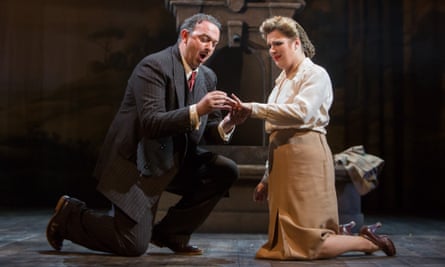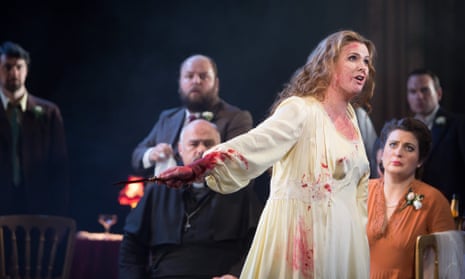In Stephen Unwin’s production of the Donizetti opera, the period suggested by Jonathan Fensom’s costumes is the 1940s, while visually there is no discernible Scottish element. In a sense, such things don’t matter: drawn from a Walter Scott novel itself loosely based on an event that took place in the late 17th century, Lucia di Lammermoor is essentially about forced marriage – something that could occur in almost any society, including our own.
Widely regarded as one of the high points of early 19th-century opera, the score depends above all on fine singing to make its mark. While none of the central roles is outstandingly sung here, all three of the principals have their qualities, and each of them gets better as the evening proceeds.
Welsh soprano Elin Pritchard is up to most of the challenges of the title role, even if her higher register lacks the ideal breadth and strength fully to encompass the music’s needs; but she shines in the famous Mad Scene. Welsh tenor Adriano Graziani looks on the respectable side for her semi-outlawed lover Edgardo, but the genuinely Italianate quality of his vocalism proves an asset. As her bullying brother Enrico, baritone Stephen Gadd summons up the heft and dynamism required to push through his dastardly scheme to shore up his family’s failing fortunes by sacrificing his sister’s happiness.

The secondary roles are variable. Andrew Greenan’s chaplain Raimondo is vocally and dramatically tepid, while Richard Roberts’s treacherous retainer Normanno is small-scale. Acting standards are variable throughout, with not enough of the opera’s sequence of great scenes really hitting the spot.
This is partly a result of Stephen Barlow’s lacklustre conducting – far less assured here than in the big late-Romantic scores at which he excels; but the Buxton Festival Chorus and the Northern Chamber Orchestra do their duty and more.
- In rep at the Opera House, Buxton, until 25 July. Box office: 0845 127210.

Comments (…)
Sign in or create your Guardian account to join the discussion